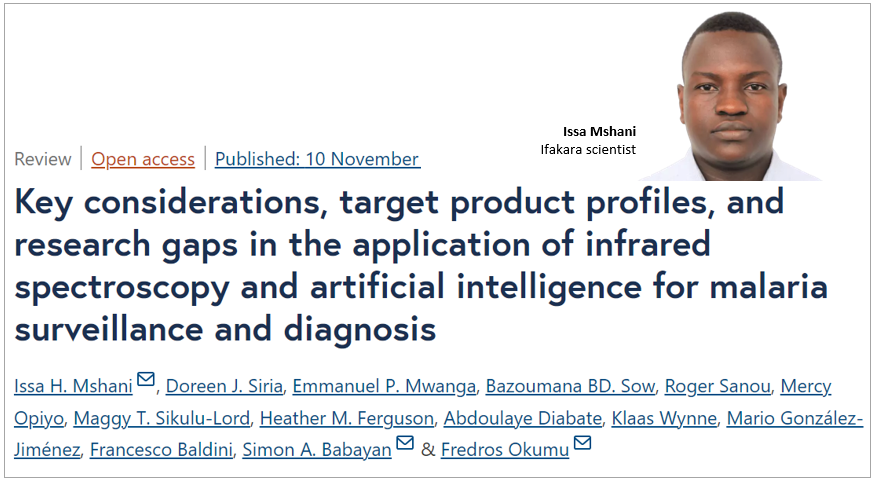
SURVEILLANCE: Optimizing artificial intelligence in the fight against malaria

In the ongoing effort to eliminate malaria, scientists in recent years have underscored the need to develop simple, low-cost and scalable methods to evaluate key entomological and parasitological indicators of malaria.
An innovative approach discovered in the quest involves the integration of infrared spectroscopy (IR) and machine learning (ML), whereby numerous studies suggest a promising direction that can transform malaria surveillance and response strategies.
Insights into IR-ML technologies
In light of this breakthrough, scientists from Ifakara Health Institute and the University of Glasgow with contributions from other partner institutions, recently published a comprehensive review of existing applications of IR and ML in malaria surveys and parasite screening.
Published in the Malaria Journal, the review aims to bridge knowledge gaps and offer insights into refining these technologies for optimum use in the fight against malaria, particularly in low-income settings.
“Multiple studies have demonstrated that the combination of IR spectroscopy and ML can yield accurate predictions of epidemiologically relevant parameters of malaria in both laboratory and field surveys. Proven applications now include determining the age, species, and blood-feeding histories of mosquito vectors as well as detecting malaria parasite infections in both humans and mosquitoes,” writes the scientists.
Ifakara leads the study
Led by Ifakara Health Institute scientists Issa Mshani and Fredros Okumu, along with colleagues Francesco Baldini and Simon Babayan from the University of Glasgow and contributors from other institutions, the paper reviewed existing IR and ML applications and their gaps for malaria surveys and parasite screening and provides initial suggestions on target product profiles (TPPs) for such technologies in low-income settings.
Mshani and colleagues dive into the current applications of IR and ML approaches, shedding light on their effectiveness in investigating malaria indicators in diverse settings, ranging from field surveys to controlled laboratory environments.
"The combination of IR and ML is being considered a promising new method for predicting or estimating various entomological and parasitological indicators of malaria. The IR-ML platforms have the added advantage of being simple to use, reagent-free, high-throughput, low-cost, and applicable in rural and remote settings.”
Gaps in IR-ML application
Furthermore, the scientists identify seven key research gaps in the applications of IR and ML in the malaria context, urging the scientific community to explore uncharted territories and address critical questions.
Some of the gaps include an insufficient understanding of IR spectroscopic signals relative to specific biological traits, inadequate field validation of IR-ML approaches, gaps in machine learning frameworks for IR spectroscopy analysis, and uncertainty about the best method for classifying mosquito age, among others.
Proposed TPPs
In an effort to guide future development and testing, the scientists propose initial target product profiles (TPPs) tailored for IR and ML technologies in low-income settings. The TPPs serve as a blueprint for researchers and developers, outlining the essential characteristics and performance criteria required for the successful deployment of IR spectroscopy and ML techniques in resource-constrained environments.
Study Contributors
The study was led by Ifakara Health Institute scientists, Issa Mshani and Fredros Okumu and colleagues Francesco Baldini and Simon Babayan from the University of Glasgow along with other contributors from Institut de Recherche en Sciences de la Santé (IRSS), Burkina Faso, Centro de Investigação em Saúde de Manhiça (CISM), Mozambique and The University of Queensland, Australia.
Other Ifakara scientists involved in the systematic review are Doreen Siria, Emmanuel Mwanga and Heather Ferguson.
Read the full publication here.
